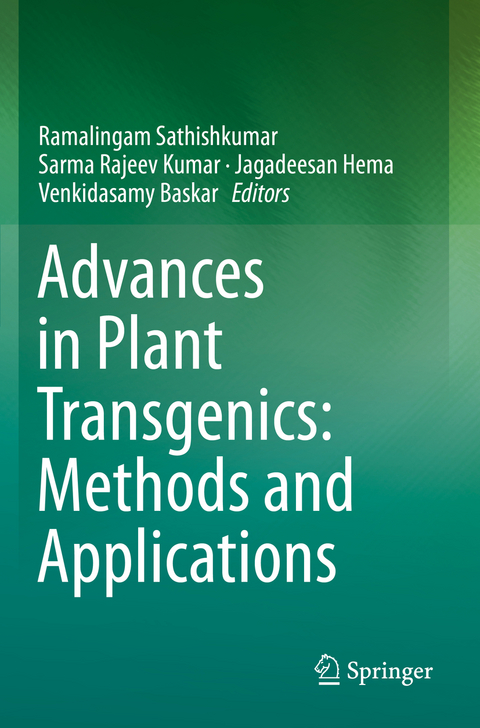
Advances in Plant Transgenics: Methods and Applications
Springer Verlag, Singapore
978-981-13-9626-7 (ISBN)
This book discusses the commercial applications of plant transgenic technologies, including the use of transgenic cell culture approachesto improve the production of metabolites and high-value therapeutics as well as transgenic plants in pest management. It also explores generation of novel vectors, protein production using chloroplast engineering and the latest developments in this area, such as genome editing in plants. Featuring general discussions and research papers by leading international experts, it is a valuable resource for scientists, teachers, students and industrialists working in the field.
Dr. R. Sathishkumar is currently a Professor of Biotechnology at Bharathiar University, India. He holds PhD from School of Biological Sciences, Madurai Kamaraj University, India and gained Post- doctoral training from The University of Hong Kong, Hong Kong. The thrust area of his research includes Plant Molecular Farming, Plant Metabolic Engineering and DNA Barcoding. He has supervised 12 PhD’s and mentored 4 Post-doctoral fellows till now. He has secured both national and international funding for his research. He has a US patent and filed an Indian patent. To his credit he has 70 peer reviewed journal and 22 book chapter publications. Recently, he was elected as a subcommittee member on DNA barcoding by Indian Pharmacopeia Commission (IPC), Government of India. He is a consultant for many of the Indian herbal industries. Dr. Rajeev Kumar is working as Scientist in String Bio Private Limited, India after completing 5 years of post-doctoral research in CSIR- Central Institute of Medicinal and Aromatic Plants, Lucknow and Research Centre Bangalore. He received fellowships like Senior Research Associateship from Council of Scientific and Industrial Research, Govt. of India and Research Associateship from Department of Biotechnology, Govt. of India. During his PhD tenure, he was awarded one year fellowship from Foundation for Science and Technology, Portugal to work with Prof. Birgit Arnholdt-Schmitt, University of Evora, Portugal. He has published 15 research papers in international peer-reviewed journals and authored 14 book chapters. Dr. Hema Jagadeesan is currently an Associate Professor in Biotechnology at PSG College of Technology, India and actively pursuing research in the area of environmental biotechnology, especially plant-microbe interactions in remediation. She holds a PhD in Plant Sciences from Madurai Kamaraj University, Madurai, India and MSc. in Environmental Sciences from Jawaharlal Nehru University, New Delhi, India. She is the recipient of Council of Scientific and Industrial Research (CSIR) Junior and Senior research Fellowships for her doctoral research. She has eight international journal articles and more than eleven conference publications. She has worked as Programme Officer (Scientist C) in “The Centre for Environment Education”, (Supported by the Ministry of Environment and Forests, Government of India, India). Dr. Baskar Venkidasamy is working as a consultant in Texcity Biosciences Pvt Ltd., India. He completed his post-doctoral research in Bharathiar University, India in the DST-SERB N-PDF scheme. He received fellowship from Konkuk University, S. Korea for doing PhD in Molecular biotechnology. His area of expertise is genetic engineering of plants for improved traits such as stress tolerance, enhanced health and nutritive values. He obtained his master’s degree in Biotechnology from Bharathidasan University and bachelor’s degree in Microbiology from Madurai Kamaraj University. He has published 20 peer reviewed publications in internationally reputed journals and 3 book chapters in international publishers.
Chapter 1. Plant Tissue Culture and DNA Delivery Methods.- Chapter 2. Cell Cultures and Hairy Roots as Platform for Production of High Value Metabolites: Current Approaches, Limitations and Future Prospects.- Chapter 3. Integrating Bioinformatics and Omics tools for systems analysis of abiotic stress tolerance in Oryza sativa (L.).- Chapter 4. Green Biotechnology: A brief update on Plastid Genome Engineering.- Chapter 5. New Generation Transformation Vectors.- 6 Recent Developments in Generation of Marker Free Transgenic Plants.- Chapter 7. Applications of Genome Engineering/Editing Tools in Plants.- Chapter 8. High Throughput Analytical Techniques to Screen Plant Transgenics.- Chapter 9. Transgenic Technologies and their Potential Application in Horticultural Crop Improvement.- Chapter 10. Commercial Application of Transgenic Plants in Virus Management.- Chapter 11. Application of Reed Beds in Wastewater Treatment: Scope for Transgenic Plants.- Chapter 12. Inspection of Crop Wild Relative (Cicer microphyllum) as Potential Genetic Resource in Transgenic Development.- Chapter 13. Genome Modification Approaches to Improve Performance, Quality and Stress Tolerance of Mediterranean Fruit Species.- Chapter 14. Key Challenges in Developing Products from Transgenic Plants.- Chapter 15. Enhanced Production of Therapeutic Proteins in Plants: Novel Expression Strategies.- Chapter 16. Transcriptional Engineering for Enhancing Valuable Metabolites in Photosynthetic Microalgae.
| Erscheinungsdatum | 16.01.2021 |
|---|---|
| Zusatzinfo | 23 Illustrations, color; 3 Illustrations, black and white; XXII, 366 p. 26 illus., 23 illus. in color. |
| Verlagsort | Singapore |
| Sprache | englisch |
| Maße | 155 x 235 mm |
| Themenwelt | Naturwissenschaften ► Biologie ► Botanik |
| Technik ► Umwelttechnik / Biotechnologie | |
| Schlagworte | Metabolic Engineering • molecular farming • Phytoremediation • Stress tolerance • transgenic plants |
| ISBN-10 | 981-13-9626-4 / 9811396264 |
| ISBN-13 | 978-981-13-9626-7 / 9789811396267 |
| Zustand | Neuware |
| Haben Sie eine Frage zum Produkt? |
aus dem Bereich


